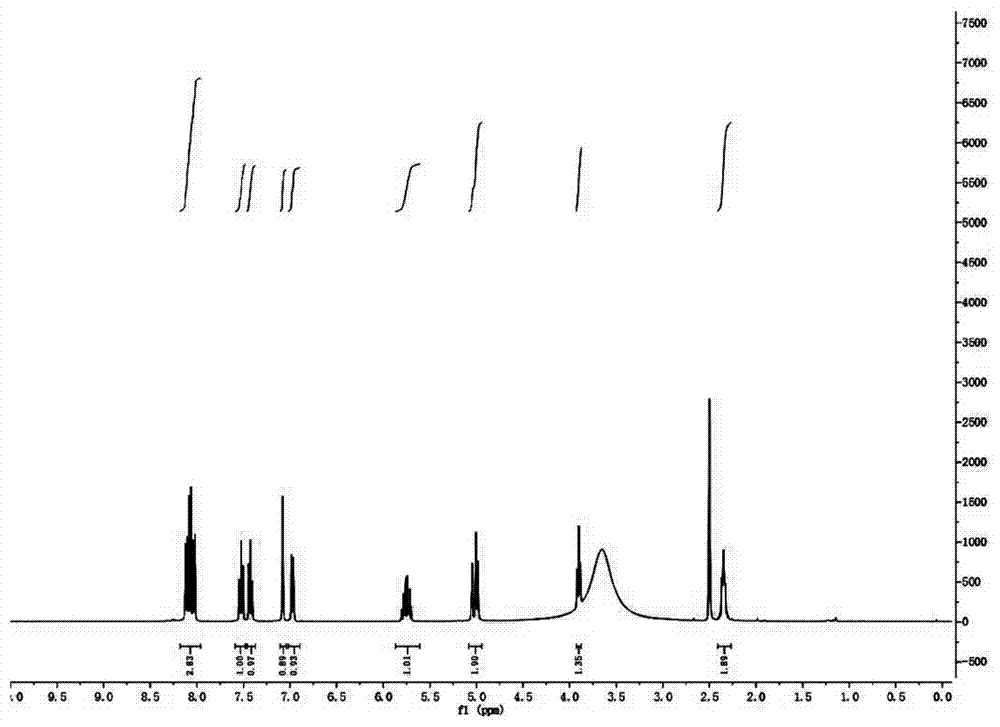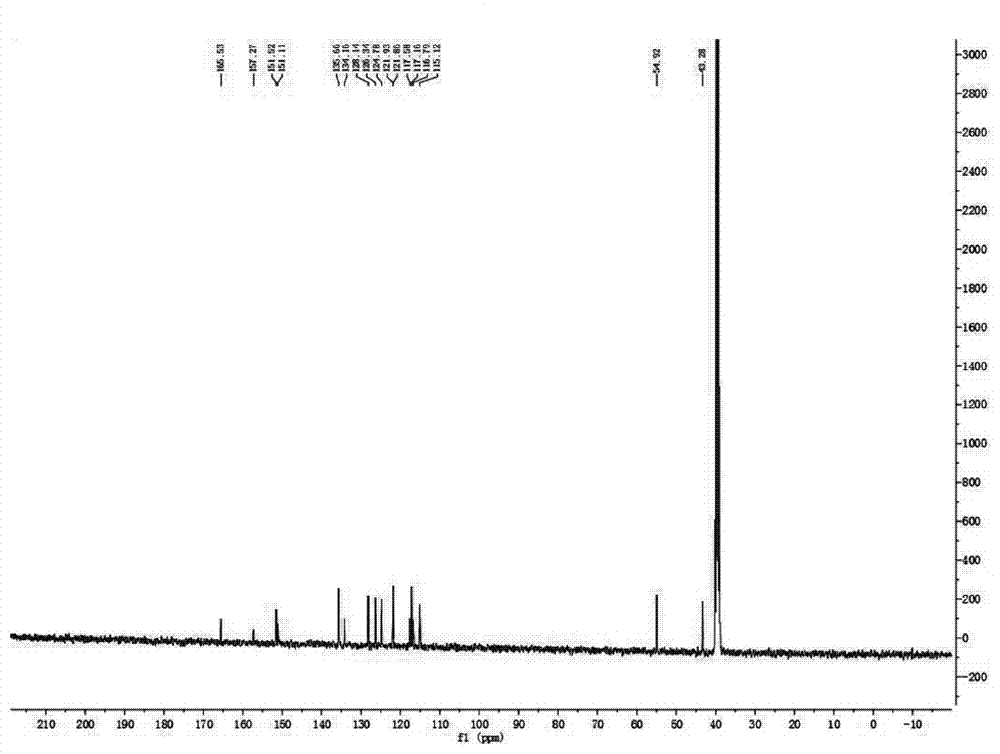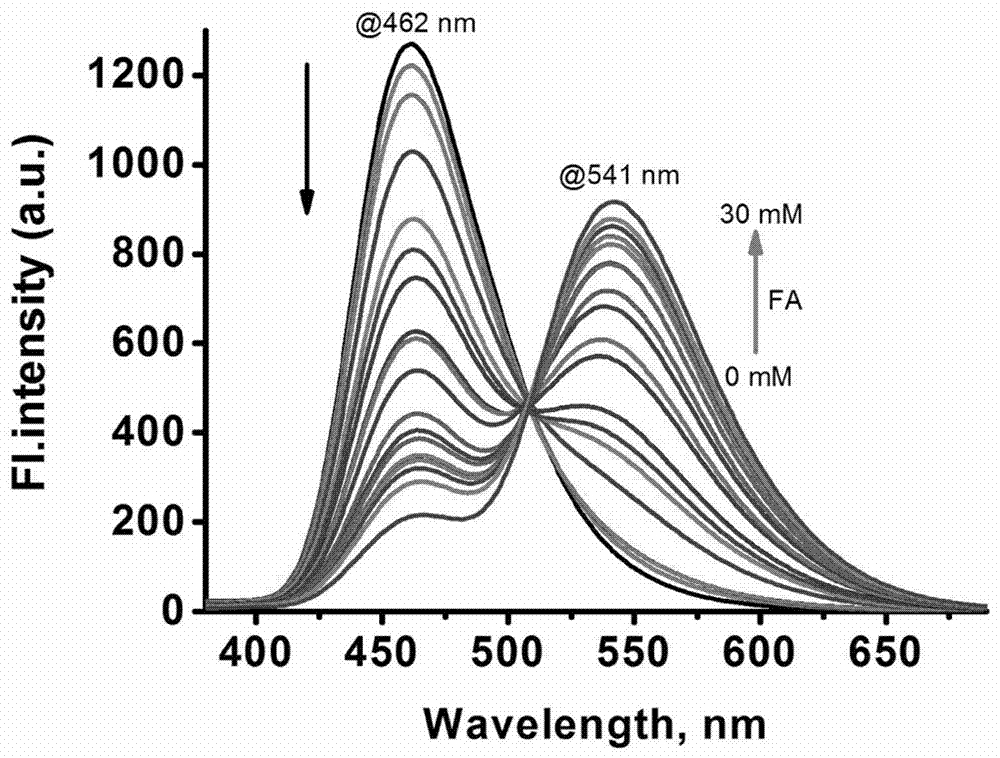Preparation method and application of fluorescent probe for detecting formaldehyde
A fluorescent probe, formaldehyde technology, applied in the field of fluorescent probes, can solve problems such as different application fields
- Summary
- Abstract
- Description
- Claims
- Application Information
AI Technical Summary
Problems solved by technology
Method used
Image
Examples
Embodiment 1
[0023] Embodiment 1: the synthesis of probe FAP:
[0024]
[0025] Dissolve 81.2 mg of potassium allyltrifluoroborate in 5 mL of ammonia methanol solution (concentration: 7 mol / L), and stir at room temperature for 15 min under nitrogen protection.
[0026] Dissolve 35.1 mg of raw material 1 in 2 mL of ammonia-methanol solution (concentration: 7 mol / L), add 20 μL of water, inject the reaction solution into ammonia-methanol solution of potassium allyltrifluoroborate, and react at room temperature for 16 h. After the reaction was completed, the solvent was removed by distillation under reduced pressure with a rotary evaporator to obtain a crude product. Using ethyl acetate and petroleum ether at a volume ratio of 1:4 as the eluent, the product was purified with a 200-300 mesh silica gel chromatography column to obtain 28.4 mg (70%) of a yellow solid.
Embodiment 2
[0027] Embodiment 2 probe changes with the addition of fluorescence spectrograms of different equivalents of formaldehyde
[0028] The probe FAP prepared in Example 1 was dissolved in DMSO to make a probe mother solution with a concentration of 1 mM, and a formaldehyde solution with a mass fraction of 37% was added to distilled water to prepare a formaldehyde mother solution with a formaldehyde concentration of 600 mM. Prepare acetonitrile:PBS buffer (0.01mM, pH=7.4) = 2:3 (volume ratio) spectrum solution, 3mL for each test tube. Take 60 μL (20 μM) from the probe mother solution and add it to a small test tube containing 3 mL spectrum solution, add different concentrations of formaldehyde (0, 0.25, 0.5, 2, 3, 4, 6, 7, 8, 10, 12, 13 ,14,15,16,17,18,20,25,30mM). Fluorescence spectrum changes of probes and different equivalents of formaldehyde reaction solutions were tested with a fluorescence spectrometer. Fluorescence spectrum changes as image 3 shown. image 3 It is the a...
Embodiment 3
[0029] Embodiment 3 in calf serum probe FAP changes with the fluorescence spectrogram of different equivalents of formaldehyde
[0030] Take the probe mother solution and formaldehyde mother solution prepared in Example 2, and prepare a spectral solution of calf serum:PBS buffer (0.01mM, pH=7.4)=2:98 (volume ratio), 3mL per test tube. Take 60μL (20μM) from the probe mother solution and add it to a small test tube containing 3mL spectrum solution, add different concentrations of formaldehyde (0, 0.25, 0.5, 0.75, 1, 1.5, 2, 3, 3.5, 4, 4.5, 5 , 6, 7, 8, 9, 10, 12, 15 mM). Fluorescence spectrum changes of probes and different equivalents of formaldehyde reaction solutions were tested with a fluorescence spectrometer. Fluorescence spectrum changes as Figure 4 shown. Figure 4 It is the variation of the fluorescence spectrogram of the probe FAP in calf serum in Example 3 with the addition of different equivalents of formaldehyde. Among them, the fluorescence peak at 462nm, from...
PUM
 Login to View More
Login to View More Abstract
Description
Claims
Application Information
 Login to View More
Login to View More - R&D
- Intellectual Property
- Life Sciences
- Materials
- Tech Scout
- Unparalleled Data Quality
- Higher Quality Content
- 60% Fewer Hallucinations
Browse by: Latest US Patents, China's latest patents, Technical Efficacy Thesaurus, Application Domain, Technology Topic, Popular Technical Reports.
© 2025 PatSnap. All rights reserved.Legal|Privacy policy|Modern Slavery Act Transparency Statement|Sitemap|About US| Contact US: help@patsnap.com



